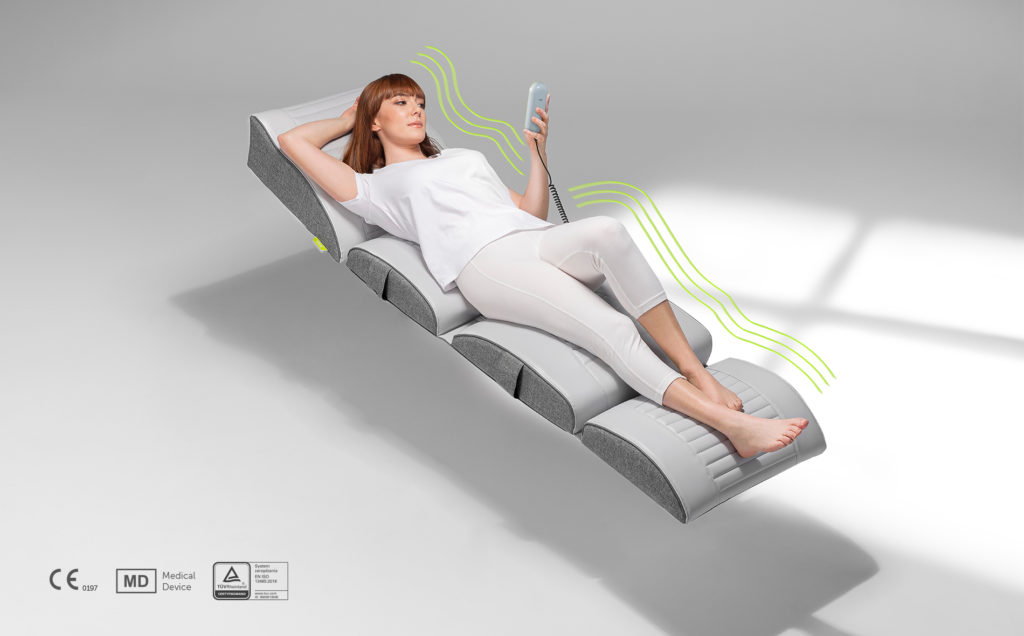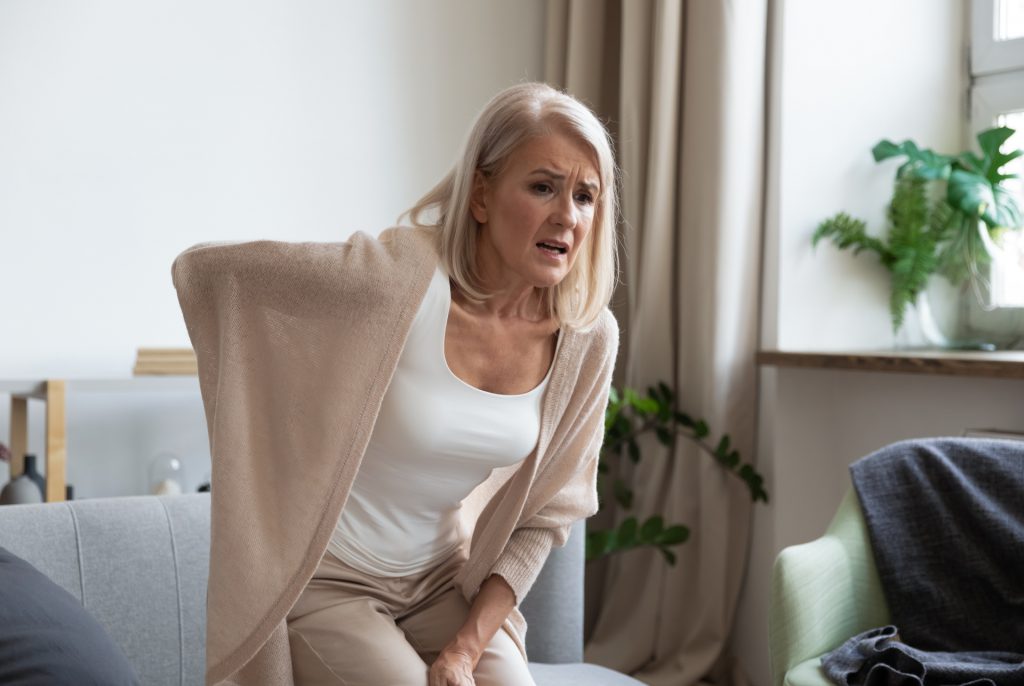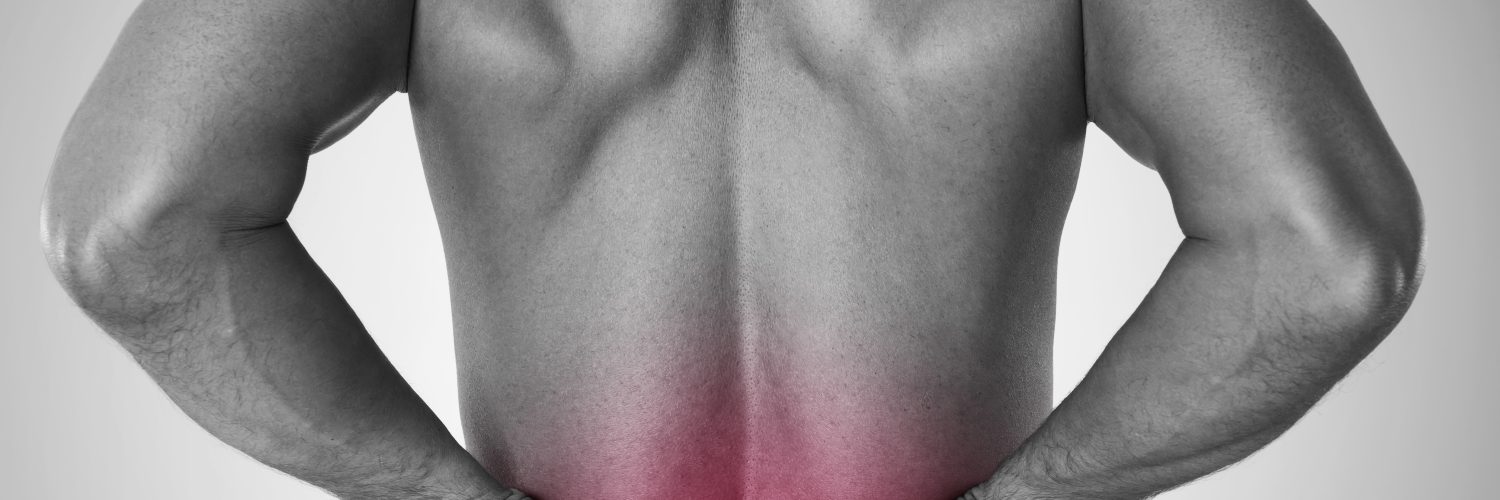Chronic low back pain is a common health problem, affecting a significant proportion of the adult population. Despite the frequency of this condition, traditional treatments often have limited effectiveness. In recent years, vibrotherapy has been increasingly used as an intervention tool for musculoskeletal disorders and as an effective method of pain relief without side effects.
Low back pain
Low back pain is a common ailment that affects the lower back, i.e. the area between the lower ribs and the buttocks. This type of pain can have a variety of causes and symptoms, significantly affecting daily functioning.
Causes of back pain:
Muscle tension: Prolonged sitting, poor posture or even stress can lead to excessive tension in the back muscles, causing pain in the sacrum.
Spinal problems: Degeneration of intervertebral discs, herniated discs or spinal conditions such as spinal arthritis can all be sources of pain.
Age-related changes: Aging can lead to natural wear and tear of the spinal structures, which in turn can cause low back pain.
Overloading and trauma: Sudden movements, heavy lifting or injuries caused by accidents can lead to back pain.
Internal diseases: Some diseases, such as kidney infections or diseases of the urinary tract, can manifest themselves as lower back pain.

Symptoms of sacral pain:
Pain of an acute or chronic nature: Back pain can be sudden and intense or gradually increase in intensity, becoming chronic.
Sensation of discomfort in the back area: The discomfort may radiate both upwards and downwards, also manifesting as leg pain.
Restriction of movement: Pain in the back often causes difficulties in moving, especially when bending or turning the trunk.
Muscle fatigue: prolonged back pain can lead to a feeling of back muscle fatigue.
It is important to consult a doctor if you have back pain, especially if it is persistent, worsening or associated with other symptoms. Early diagnosis and effective treatment can help alleviate the condition and improve quality of life.
Back pain – how to treat it?
Back pain is a common problem that affects many people. It is an ailment that can significantly affect daily functioning. If you are struggling with lower back pain, there are several effective treatments that can provide relief and improve your quality of life.
- Pharmacotherapy:
- Painkillers, such as non-steroidal anti-inflammatory drugs (NSAIDs), can help relieve pain and reduce inflammation.
- Myorelaxant drugs may be recommended for muscle tension associated with sacral pain.

2. Physiotherapy:
- Physiotherapists can help develop a personalised exercise programme to strengthen back muscles, improve flexibility and reduce pain.
- Massage techniques and spinal manipulation by professionals can also provide relief.

- Vibration therapy – vibrotherapy:
- Recent studies suggest that vibration therapy can be an effective method of relieving sacroiliac pain. Using whole-body vibration or local vibration, lumbar function can be improved and pain can be reduced.

4. Lifestyle changes:
- Regular physical activity, especially back-strengthening exercises, can help improve muscular fitness.
- Take care of correct posture when sitting and walking.
- Avoid sitting for long periods of time and try to change your body position frequently.
5. Diet and supplementation:
- A diet rich in anti-inflammatory ingredients, such as omega-3, can support the management of chronic pain.
- Supplements such as vitamin D, calcium and magnesium can support bone and muscle health.
Each case of sacroiliac pain can be different, so it is important to tailor treatment to the individual patient.
Latest medical data
In a 2023 comprehensive systematic review, researchers analysed the effectiveness of vibration therapy (vibrotherapy) in relieving pain and improving function in people with CLBP. The study published in the internationally renowned medical journal, the Journal of Orthopaedic Surgery and Research.

The most popular medical search engines such as PubMed, Cochrane Library, Web of Science, Embase, CNKI, Wanfang Date, VIP and CBM were used to search the database. Top studies such as clinical randomised controlled trials on vibration therapy in patients with CLBP were analysed. Electronic databases were searched from inception to 1 July 2023. Outcome indicators were pain intensity index.
Fourteen papers met the inclusion criteria, comprising 860 participants. Vibrotherapy in patients with CLBP resulted in a reduction in pain intensity index. Detailed analysis of efficacy showed that the pain intensity index was lower in the vibrotherapy group than in the group without.
Pain relief without medication?
Clinical data suggest that vibration therapy can reduce pain and improve lumbar mobility function in patients with chronic pain. Medical results indicate that both whole-body and localised vibration therapy relieve patients’ sacral pain.
Compared to local vibration therapy, whole-body vibration therapy has a broader application. Vibrotherapy is clinically used for knee arthrosis, post-stroke rehabilitation and cerebral palsy, among others. Whole-body vibration therapy has many advantages. Firstly, whole-body vibration therapy can significantly activate trunk muscle fibres and improve muscle strength, which is helpful in the prevention and treatment of chronic sacroiliac pain. Secondly, whole-body vibration therapy can relax the muscles of the lower back, reducing pain. Thirdly, whole-body vibration therapy can improve proprioceptive function by activating proprioceptive receptors, leading to improved spinal function and instability in patients with pain. Local vibration therapy can also benefit treatment, involving the use of an automated mechanical device to deliver local vibrations directly or indirectly to the muscles, tendons and joints of the body. It can enhance proprioception, similar to whole-body vibration therapy, improve flexibility and mobility of local ligaments and tendons, stimulate blood and lymphatic fluid circulation around joints, facilitate synovial fluid secretion and flow, and reduce swelling and joint capsule contraction.

Summary
In summary, sacroiliac pain is a common problem, the effective treatment of which requires a comprehensive approach. Traditional methods such as pharmacotherapy, physiotherapy and lifestyle changes are often used to alleviate the condition. Recent studies suggest that vibration therapy, both whole-body and local, can be an effective and safe method to bring relief to patients with sacroiliac pain.
It is important to emphasise that each case of sacroiliac pain is like a unique story. An individualised approach that takes into account the specific needs of the patient is the key to success. This may include a combination of physiotherapy, physical activity and wise diet and lifestyle changes. And, most importantly, it is worth noting that vibrotherapy is one of those rare methods that can be combined with other forms of treatment – without any side effects! It really is worth giving it a try – because whoever has experienced the effects of vibrotherapy once, rarely ever gives it up! Especially since vibrotherapy devices have no expiry date :).
Based on:
Li Q, Liu P, Wang Z, Li X. Vibration therapy to improve pain and function in patients with chronic low back pain: a systematic review and meta-analysis. J Orthop Surg Res. 2023 Sep 26;18(1):727. doi: 10.1186/s13018-023-04217-2. PMID: 37752526; PMCID: PMC10523661.




